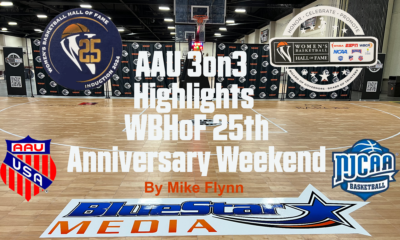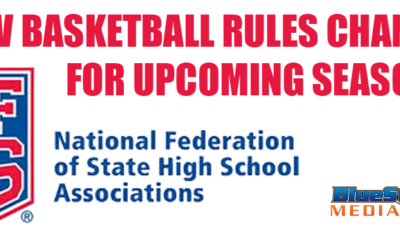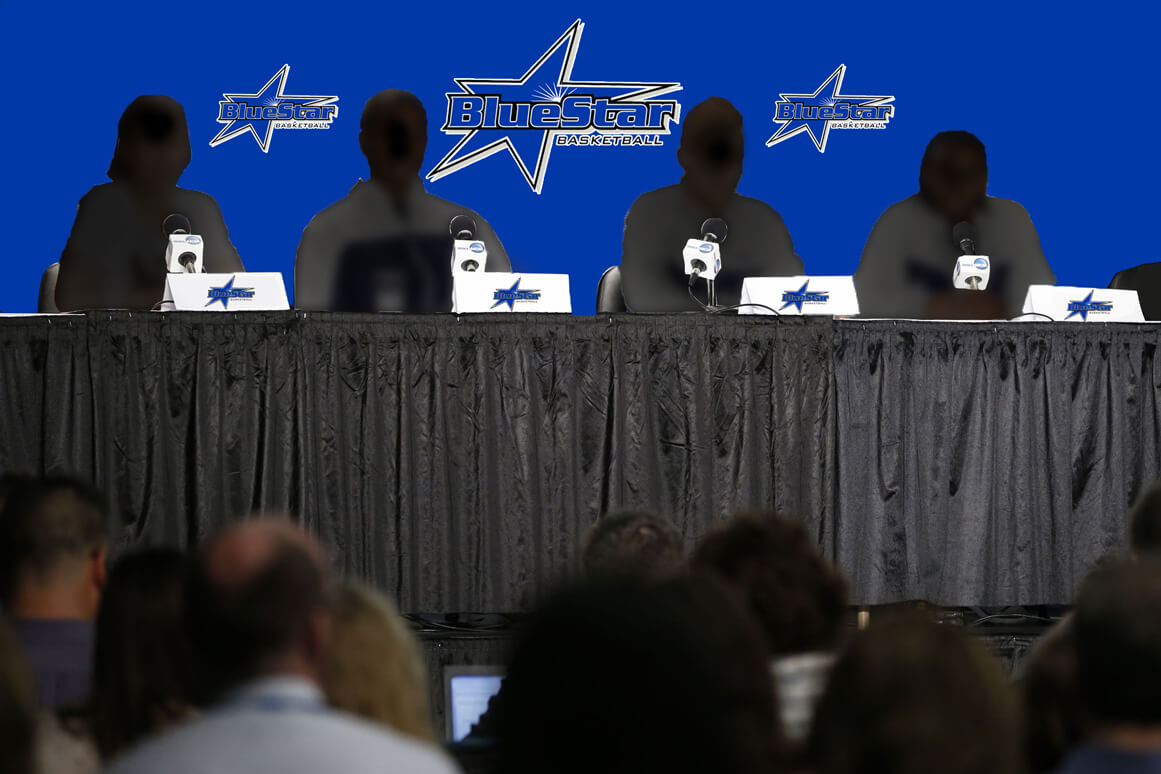On Monday afternoon, I was having a water cooler conversation at work about Pat Summitt, and the void she has left in women’s college basketball, when my colleague got a text message:
Andy Landers was retiring.
After 36 seasons, more than 850 wins, five Final Fours, 11 SEC regular season and four SEC tournament titles, coaching two Naismith Hall of Famers and his own induction in the Women’s Basketball Hall of Fame, the only full-time women’s coach University of Georgia has ever had is stepping away from the game.
He said he first mulled the possibility after the Lady Bulldogs were beaten by Tennessee for the third time this season, in the SEC Tournament, and at the end of a dreary 17-13 season.
“I thought about it for a week,” Landers said at a quickly arranged press conference in the UGA basketball practice facility Monday afternoon. “I tried to spin it. But I just couldn’t spin it.”
A few hours later, the NCAA brackets were revealed without Georgia’s name in it for the first time since 1994.
The Lady Bulldogs program Landers had built from scratch, out of the mire of pre-Title IX indifference on a football-mad campus, has faded from the ranks of women’s basketball’s elite in the last decade or so.
I covered three of those Final Four teams, in the 1990s, when Saudia Roundtree and Georgia went to the 1996 national championship game, and later in 1999, when Kelly and Coco Miller were sophomores.
That was the last of those Final Four trips, as it turned out. Sixteen years is a long time by any measure, and in women’s basketball so much has changed in that time. It’s not just UConn’s dominance; top-notch high school players have many more options to choose from and not enough of them were choosing Georgia. 
At the age of 62, in good health and with his trademark blend of thoughtfulness and humor on display, Landers fought back emotions to explain that the standard he expected of everyone who played for him was something he could not meet himself.
“It was apparent to me we weren’t doing what we built this thing to do and that responsibility was mine. . . .
“Sometimes fire and energy isn’t enough. . . . I still have a lot of fire and energy. We’re not reaching the level of success” to which Georgia teams had become accustomed.
He mentioned the athletic directors he has worked for — Vince Dooley, who hired him, Damon Evans and Greg McGarity, his current boss, saying that he told the latter that “they wouldn’t have to tell me. I’d know when it was time.”
If anyone deserves a chance to leave on his own terms, Landers certainly does. At times during the current season, I wondered if that time would be sooner rather than later. After Georgia defeated Texas A & M in Athens in late January, they stumbled badly, piling up some new lows in the Landers era, including an eight-game losing streak, to finish 2-9.
That’s just unheard of for a Georgia team.
But the real stunner was a 44-26 loss to Auburn, reflecting a program-worst single-game scoring mark, and to a Tigers team (coached by Terri Williams Flournoy, a former Georgia assistant) that hadn’t won an SEC game all season.
For several years, Georgia’s decline has been reflected in offensive struggles. This is the eighth consecutive season the Lady Dogs have averaged 70 points or less for the season. That happened only one other time in all of Landers’ tenure, the season after the Miller twins graduated.
For a coach who embodied the full embrace of recruiting in the women’s game during the late 1970s and early 1980s, in the last decade Landers hasn’t reeled in the gifted players who made his teams offensively dynamic and demons on defense.
His recruiting coordinator, Michael Shafer, left for Richmond in 2006, at the dawn of a golden age for female youth basketball in the state of Georgia. Maya Moore’s signing with UConn the following year was only the start of a caravan of in-state players who went elsewhere, including most recently, Diamond DeShields, Allisha Gray, Kaela Davis, Andraya Carter, Te’a Cooper and Asia Durr.
The Lady Dogs got to the Elite Eight in 2013 with a fine senior class of Jasmine Hassell, Jasmine James and Anne Marie Armstrong, but there wasn’t much coming in after that.
And there is the colossus that Dawn Staley is building next door at South Carolina. In addition to being part of a newer wave of nationally prominent programs, the Gamecocks are leading the nation in attendance, developing a fan base that Georgia never could consistently maintain, even in Landers’ best seasons.
Landers was asked on Monday about regrets, and he quickly mentioned the second half of the 1985 NCAA title game against Old Dominion, when he put Teresa Edwards back on the floor with four fouls. She fouled out a couple minutes later as the Lady Dogs missed out on a chance to win a national championship that eventually eluded Landers.
He said he would do it all over again, “probably.”
Landers also copped to making his fair share of mistakes, but grinned when he said that “I’ve had enough good players to cover for me. You’ll never know when those times were.”
Typical Landers. It was a blast to cover some of his best teams, and to travel with them to more than 20 states, ranging beyond SEC country to Storrs, State College, Blacksburg, Philadelphia, Nacogdoches, West Lafayette, Des Moines, Missoula, Portland and Seattle.
The 1995-96 season was the most special of all. Roundtree was the national player of the year, the Lady Dogs were ranked No. 1 and had a remarkable stretch in which they played five consecutive games, four on the road, against ranked teams, and won them all, including against Tennessee and Connecticut.
The win at UConn was a hoot, the first loss for the Huskies since they won their first national title the previous season. At the post-game press conference, excited Georgia players gave long answers to questions.
At one point, Landers stepped to the microphone and cracked: “You’ll have to forgive these young ladies. They’re Southern Baptists.”
The Lady Vols got Georgia back in the national title game, playing stifling defense, rendering Roundtree a non-factor.
On the drive home from Charlotte, I swung through Athens and pulled in front of Stegeman Coliseum. Landers was standing near the entrance, looking out into the distance. There wasn’t much to say, and the pain in his face was obvious.
He didn’t have to stay there, saying what little he could muster, especially to a reporter. But he always made time, even when the time wasn’t ideal. The enthusiasm Landers brought to the game was infectious, and you could see he still had plenty of it, even though the results in recent years haven’t been what he expected.
On Monday, one of the coaches calling to wish him well was Geno Auriemma, who recapped the conversation for Carl Adamec of the Manchester Journal-Inquirer:
“I asked him, ‘Is it true? What the hell are you going to do?’ He said, ‘I’m going fishing.’ Who knows? Two weeks from now, I might be joining him.”
The iconic figures of the game, who forged their personality and drive during a critical time in its development, continue to dwindle.
Just three years after Summitt was forced to retire due to early onset dementia, Landers is walking away from a sport that has been undergoing massive generational change in the coaching ranks.
Only a handful of holdovers remain from the AIAW years and the early NCAA period, and you can literally count them on one hand: Jim Foster, Tara VanDerveer, Vivian Stringer, Gary Blair, Sylvia Hatchell.
They’re still going strong, all five of them with NCAA tourney games coming up.
But the game is rapidly missing its connection with the coaches who gave the game shape and character, recognizable faces rampaging on the sidelines during games and giving reporters a lot to write about with their easy accessibility.
He wasn’t always happy with what I wrote, but Landers made it very enjoyable to be on the beat.
Landers was a character, an original with a burning passion for building something out of nothing, and for knowing when it was time to let it go. He leaves behind a proud legacy that will be daunting for his successor, a hire he insisted he will not try to influence.
Said Edwards: “I really can’t conceptualize this to be honest with you. It’s going to take a little time. After playing for Coach Landers, I had to judge every other coach I had by him and no one compared. You don’t think about this when you’re playing, but he’s bigger than the game. He’s one helluva coach but that doesn’t compare to the man I love.”
Wendy Parker is a sportswriter and web editor who has covered women's basketball since the early 1990s. She is a correspondent for Basketball Times and formerly covered women's and college sports, soccer and the Olympics at The Atlanta Journal-Constitution. She is the author of "Beyond Title IX: The Cultural Laments of Women's Sports," available on Amazon, and the creator of Sports Biblio, a blog about sports books and history.

Latest Articles
-


Basketball
/ 3 days agoAAU 3on3 Highlights WBHoF 25th Anniversary Weekend
KNOXVILLE – The 25th anniversary weekend celebration of the Women’s Basketball Hall of Fame...
By Mike Flynn -


Christopher Lawlor
/ 6 days agoGONE PRO: Blue Star Media Elite 25 football rankings’ regulars Bishop Gorman (NV) and IMG Academy (FL) lead 2024 NFL Draft with three selections apiece
BENSALEM, Pa. – One of the greatest three day stretches annually in professional sports...
-


Basketball
/ 1 week agoREVISIONS: National Federation of State High School Associations announce rule changes for upcoming season; flopping will incur a technical foul
BENSALEM, Pa. – Floppers, beware, you will be warned once before being issued a...
-


Christopher Lawlor
/ 4 weeks agoUSA sweeps World Team at Nike Hoops Summit; Flagg propels men’s team with 19 points while women’s team launches fourth quarter onslaught to complete rally
PORTLAND, Oregon – Call it sweet sweep for the Americans at the Nike Hoops...



